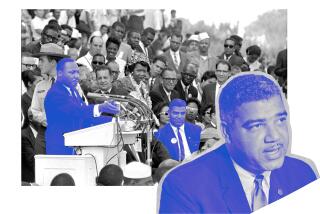The Job Isn’t Done
- Share via
The commentary by Jenny J. Cantor (“Children Have Overblown View of What Was Accomplished in the ‘60s,” April 20) presented a very negative and defeatist view of the accomplishments of the 1960s.
The view of what was accomplished on the ‘60s is not overblown. In the ‘60s we changed the world. The fact that it did not stay changed does not prove that we accomplished nothing, but rather that the job is not finished--perhaps never can be finished--and that there is much for the youth of today to do.
We were young in the ‘60s and idealistic. We volunteered for VISTA, the domestic version of the Peace Corps, tutoring black children in the rural South. Others, braver, worked on voter registration and open confrontation of segregation. Blacks and other minorities do not yet share equally in the largess of the American Dream, but we’re a whole lot better off now than we were in 1960.
We helped found the Environmental Action Network, which pursued such mundane matters as the recycling of paper and aluminum cans. We’ve made great strides on environmental issues in 20 years. DDT is no longer used, allowing pelicans to again breed in Southern California. Serious efforts are under way with toxic waste disposal.
We became heavily involved in the effort to stop the war in Vietnam. We led a peace march down the main street of the town while the real firebrands were marching on Washington. We helped organize and run the local campaign of the presidential bid of peace candidate Gene McCarthy. We went to Chicago during the tumultuous Democratic convention of 1968. The youth of this country led the way and convinced first their parents, and then their representatives, and finally the whole nation that our involvement in Vietnam was wrong, that we must adhere to the fundamental principle of self-determination upon which our nation was founded.
We accomplished a great deal in the ‘60s when, as the youth of America, we pointed the way toward a more just, environmentally sensitive and peaceful society. We changed the world.
The fact that we have not fully achieved those lofty goals, and that there are signs of backsliding on the accomplishments of the past two decades, does not prove that our efforts were in vain. It simply shows that there is still a great deal to do.
We are no longer young in the ‘80s, but are still idealistic. The realities of mouths to feed and mortgages to pay have dimmed our ardor. It is now up to the youth of the ‘80s to continue the struggle to change the world. And it is up to those of us who were young in the ‘60s to urge them on.
MARY LOU SCHULTZ
KENNETH R. SCHULTZ
Leucadia
More to Read
Get the L.A. Times Politics newsletter
Deeply reported insights into legislation, politics and policy from Sacramento, Washington and beyond. In your inbox twice per week.
You may occasionally receive promotional content from the Los Angeles Times.










